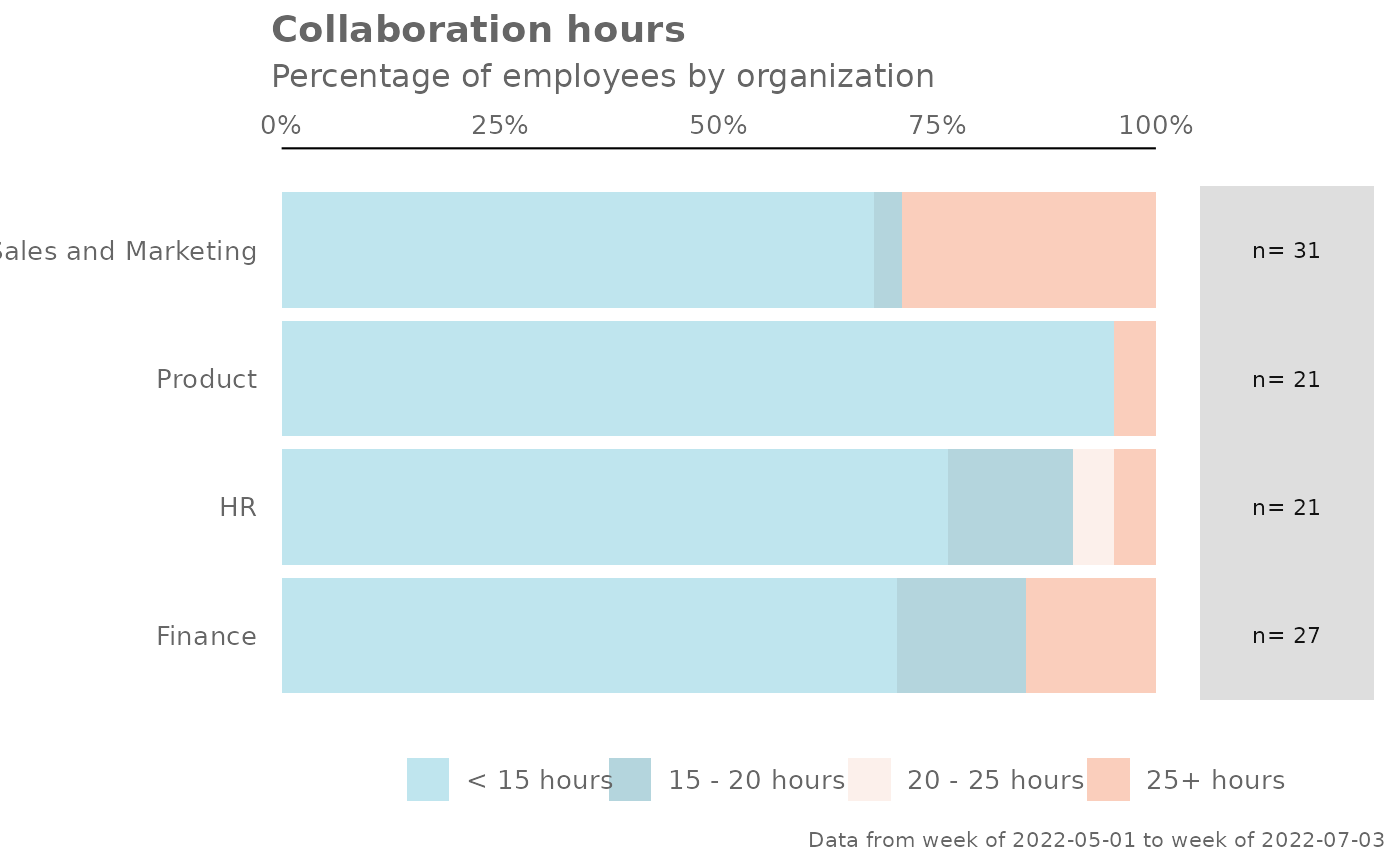
Distribution of Collaboration Hours as a 100% stacked bar
Source:R/collaboration_dist.R
collaboration_dist.RdAnalyze the distribution of Collaboration Hours. Returns a stacked bar plot by default. Additional options available to return a table with distribution elements.
Arguments
- data
A Standard Person Query dataset in the form of a data frame.
- hrvar
String containing the name of the HR Variable by which to split metrics. Defaults to
"Organization". To run the analysis on the total instead of splitting by an HR attribute, supplyNULL(without quotes).- mingroup
Numeric value setting the privacy threshold / minimum group size. Defaults to 5.
- return
String specifying what to return. This must be one of the following strings:
"plot""table"
See
Valuefor more information.- cut
A numeric vector of length three to specify the breaks for the distribution, e.g. c(10, 15, 20)
Value
A different output is returned depending on the value passed to the return argument:
"plot": 'ggplot' object. A stacked bar plot for the metric."table": data frame. A summary table for the metric.
Metrics used
The metric Collaboration_hours is used in the calculations. Please ensure
that your query contains a metric with the exact same name.
See also
Other Visualization:
afterhours_dist(),
afterhours_fizz(),
afterhours_line(),
afterhours_rank(),
afterhours_summary(),
afterhours_trend(),
collaboration_area(),
collaboration_fizz(),
collaboration_line(),
collaboration_rank(),
collaboration_sum(),
collaboration_trend(),
create_bar(),
create_bar_asis(),
create_boxplot(),
create_bubble(),
create_dist(),
create_fizz(),
create_inc(),
create_line(),
create_line_asis(),
create_period_scatter(),
create_rank(),
create_rogers(),
create_sankey(),
create_scatter(),
create_stacked(),
create_tracking(),
create_trend(),
email_dist(),
email_fizz(),
email_line(),
email_rank(),
email_summary(),
email_trend(),
external_dist(),
external_fizz(),
external_line(),
external_rank(),
external_sum(),
hr_trend(),
hrvar_count(),
hrvar_trend(),
keymetrics_scan(),
meeting_dist(),
meeting_fizz(),
meeting_line(),
meeting_rank(),
meeting_summary(),
meeting_trend(),
one2one_dist(),
one2one_fizz(),
one2one_freq(),
one2one_line(),
one2one_rank(),
one2one_sum(),
one2one_trend()
Other Collaboration:
collaboration_area(),
collaboration_fizz(),
collaboration_line(),
collaboration_rank(),
collaboration_sum(),
collaboration_trend()
Examples
# Return plot
collaboration_dist(pq_data, hrvar = "Organization")
 # Return summary table
collaboration_dist(pq_data, hrvar = "Organization", return = "table")
#> # A tibble: 7 × 5
#> group `15 - 20 hours` `20 - 25 hours` `25+ hours` Employee_Count
#> <fct> <dbl> <dbl> <dbl> <int>
#> 1 Finance NA 0.897 0.103 68
#> 2 HR NA 1 NA 33
#> 3 IT NA 0.941 0.0588 68
#> 4 Legal 0.0227 0.977 NA 44
#> 5 Operations 0.0455 0.727 0.227 22
#> 6 Research NA 0.904 0.0962 52
#> 7 Sales NA 1 NA 13
# Return summary table
collaboration_dist(pq_data, hrvar = "Organization", return = "table")
#> # A tibble: 7 × 5
#> group `15 - 20 hours` `20 - 25 hours` `25+ hours` Employee_Count
#> <fct> <dbl> <dbl> <dbl> <int>
#> 1 Finance NA 0.897 0.103 68
#> 2 HR NA 1 NA 33
#> 3 IT NA 0.941 0.0588 68
#> 4 Legal 0.0227 0.977 NA 44
#> 5 Operations 0.0455 0.727 0.227 22
#> 6 Research NA 0.904 0.0962 52
#> 7 Sales NA 1 NA 13